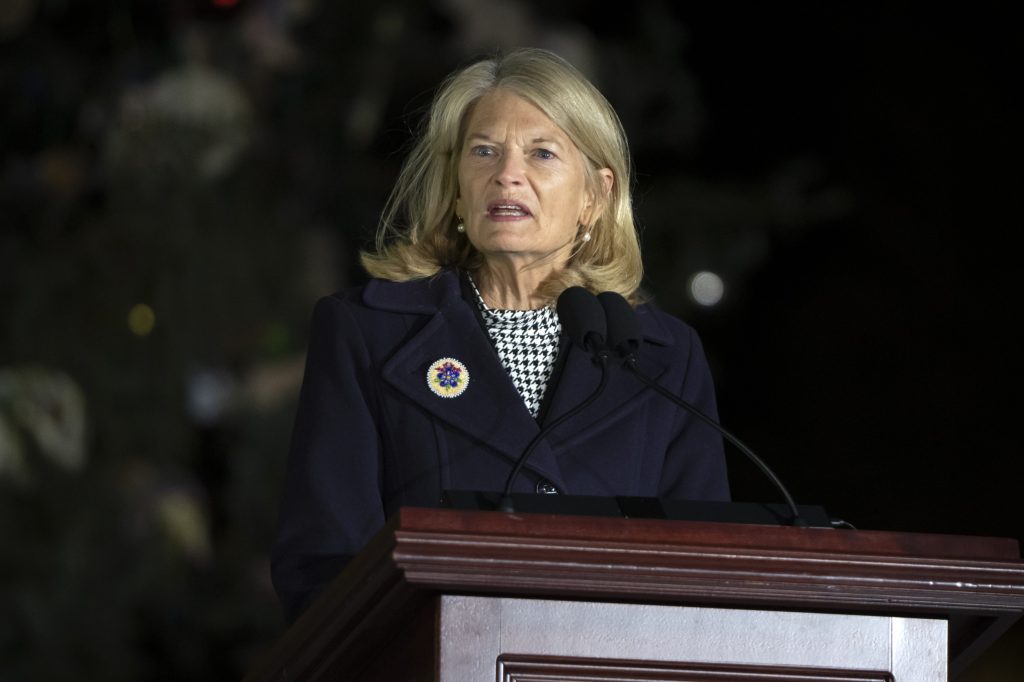Senator Lisa Murkowski’s address at the No Labels conference painted a stark picture of the anticipated political landscape under a second Trump administration, emphasizing an environment of enforced party loyalty and the potential marginalization of dissenting voices. Murkowski, known for her independent streak and willingness to break with the Republican party line, expressed concern over what she perceived as a demand for unwavering allegiance to Trump, warning that such an approach could ultimately fracture the Republican party and energize the Democratic opposition. She characterized Trump’s strategy as a “toe the line” mandate, suggesting that any deviation from the prescribed orthodoxy would result in political retribution, including primary challenges orchestrated by the Trump loyalists. This, she argued, stifles healthy debate and discourages independent thought within the party.
Murkowski’s concerns extend beyond mere political strategy to the very nature of representation. She contrasted her own political philosophy, which she identifies as more aligned with Ronald Reagan’s principles, with the current brand of Trump Republicanism. Expressing a preference for being defined by her commitment to serving her constituents rather than by party labels, Murkowski voiced her belief that the American public is yearning for a departure from the rigid binary of red versus blue politics. She sees a growing appetite for a middle ground, a space where pragmatic solutions and collaboration can supersede partisan gridlock. However, she anticipates that navigating this middle path will be increasingly difficult in the coming years, given the anticipated pressure to conform to the Trumpian agenda.
The Senator’s observations on the dynamics of party loyalty were further underscored by her commentary on the confirmation processes for Trump’s Cabinet and administrative nominees. She viewed these processes as a microcosm of the broader political climate, highlighting how even established Republican figures like Senator Joni Ernst faced backlash for expressing reservations about certain nominees. Murkowski pointed to Ernst’s initial hesitation to endorse Pete Hegseth for Secretary of Defense as a prime example of the pressure exerted on Republicans to fall in line. Despite Ernst’s conservative credentials, her questioning of Hegseth’s qualifications drew immediate criticism and threats of a primary challenge, ultimately leading her to publicly reverse her position. This incident, according to Murkowski, serves as a cautionary tale, illustrating the potential consequences of independent thought and the chilling effect it can have on open dialogue within the party.
Murkowski’s critique of the prevailing political atmosphere goes beyond simply lamenting the lack of bipartisan cooperation. She argues that the demand for absolute loyalty to Trump, coupled with the threat of primary challenges for dissenters, is actively detrimental to the Republican Party itself. This strategy, she contends, risks alienating moderate Republicans and driving them towards alternative political avenues, while simultaneously galvanizing the Democratic base. By prioritizing unwavering allegiance over constructive debate and diverse perspectives, the party, in Murkowski’s view, is not only undermining its own internal strength but also inadvertently bolstering its opposition. This creates a vicious cycle where fear of reprisal silences dissent, leading to a further narrowing of viewpoints and a deepening of the partisan divide.
The implications of this enforced loyalty, as outlined by Murkowski, extend beyond the confines of Washington D.C. She sees a broader societal impact, where the emphasis on conformity discourages independent thought and critical analysis. This, she suggests, could have far-reaching consequences for the health of American democracy. A political system that prioritizes blind loyalty over reasoned discourse, she argues, is vulnerable to manipulation and ultimately undermines the very principles of representative government. Her call for a departure from this rigid binary and a return to more collaborative, principled politics reflects a concern not only for the future of her party but also for the future of the nation.
In essence, Senator Murkowski’s address serves as a warning against the dangers of unchecked party loyalty and the suppression of dissenting voices. She paints a picture of a political landscape where conformity is rewarded and independence is punished, a dynamic she believes ultimately weakens the Republican party and undermines the broader democratic process. Her appeal for a return to more principled, collaborative governance reflects a growing concern among some within the Republican ranks about the direction of the party and the long-term implications of prioritizing loyalty over reasoned debate and diverse perspectives. Her remarks underscore a fundamental question facing not only the Republican party but American politics as a whole: can a healthy democracy thrive in an environment where conformity is prioritized over independent thought and where dissent is met with retribution?










